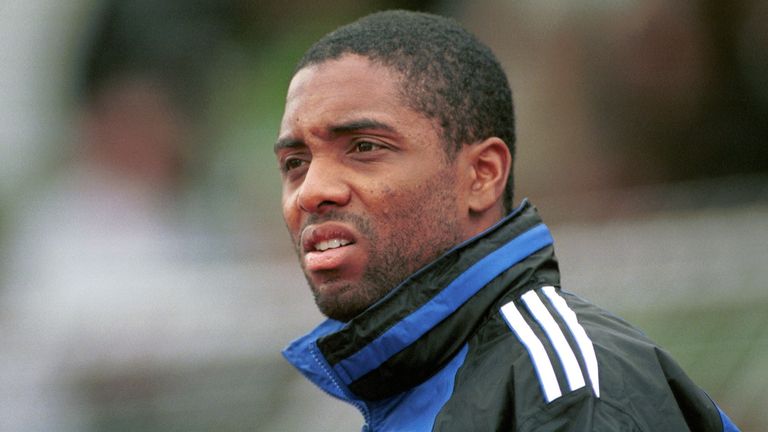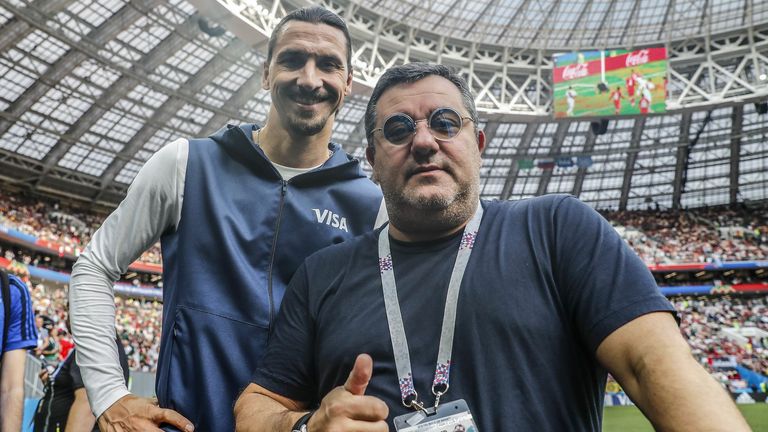Mino Raiola's rise from pizzeria worker to becoming a football super-agent
Mino Raiola played kingmaker in some of football's biggest deals but where did it begin for this super-agent and why did he have the trust of so many stars? An earlier version of this article was published in November 2021, prior to Mino Raiola's passing in April 2022

Saturday 30 April 2022 17:50, UK
Perhaps the name of Roderick Turpijn means little to you. He was a Dutch footballer who made a handful of appearances for Ajax in the 1990s before moving on to De Graafschap and drifting out of the professional game by his mid-twenties.
No matter. That one transfer had already set him up for life.
Turpijn revealed as much in his own account of the deal. In an extraordinary act of brinkmanship, his agent had walked out on negotiations with De Graafschap - then, as now, an unremarkable Dutch team. He demanded they match Turpijn's salary at Ajax.
Surprisingly, the club agreed, even throwing in bonuses. Impressive work even before you find out that the figure his agent claimed Turpijn was earning at Ajax was pure fantasy.
That agent was Mino Raiola.
Turpijn's gratitude remains - his account of this tale in the bimonthly magazine Hard Gras was entitled 'Thank you, Mino' - and perhaps the story also helps to illustrate Raiola's enduring appeal to his clients. To them, he was always the little guy out to beat the system.
Agents are sometimes styled as the enemies of the game and Raiola came to personify that more obviously than anyone else. While his contemporary Jorge Mendes is viewed as a more shadowy figure, greasing the wheels of business, Raiola was outspoken, brash.
Sir Alex Ferguson freely admits he took an instant dislike to him.
But players loved him. That exchange with Ferguson resulted in Pogba leaving for Juventus where he became a superstar, returning to Manchester United for a world record fee. Zlatan Ibrahimovic entrusted his career to him. Erling Haaland likewise.
The bonds forged with this Dutch-Italian were real.
"For the players, Mino is a great guy because he helps them to get the best contracts they can get," Michel Kreek told Sky Sports last year. "For the clubs, he is a pain in the a***."
To understand how the game's biggest stars came to rely on Raiola, it helps to go back to the beginning and those very first deals. If the Turpijn tale tells us something about his negotiating skills, others shine a light on this ability to build trust.
Kreek was a midfielder with Ajax. A two-time title winner, he was also part of Louis van Gaal's side that defeated Torino in the 1992 UEFA Cup final. But the emergence of Edgar Davids soon left him on the bench and the chance to move to Italy appealed.
In Kreek's case, the Italian club was Padova.
"Even if it was not the biggest club, it was a big move for me to go to the best league in Europe. It was a big step. I had been at Ajax since I was eight so I knew every corner of the stadium. Then you go abroad and you have to look after yourself at 23 years old."
Not quite. Kreek's manager was Rob Jansen but he had Raiola for company.
"At that time, Mino was working for Rob so he had to guide all the players who were going to Italy," Kreek explains. "In my situation, I went to Padova. Mino was the translator for everything that was said between Rob Jansen and the board of Padova."
Having worked in his parents' pizza restaurant in Haarlem since he was a boy, Raiola had a gift for business. He started Intermezzo, exploring opportunities for Dutch companies in Italy, at 17. He claimed to have been a self-made millionaire while still a teenager.
When it came to football, as a young man of Italian heritage living on the outskirts of Amsterdam, the stars aligned. Raiola was starting out at a time when a wonderful generation of Dutch talent was emerging and Serie A was the best league in the world.
"Of course, the money was better in Italy than Holland," said Kreek.
Raiola's enterprise saw him seize the chance to be a middle man. He was involved in Dennis Bergkamp's famous move to Inter but there were many more. Marciano Vink moved from Ajax to Genoa that same year. The previous summer, Bryan Roy went to Foggia.
Roy's experience with Raiola is revealing.
"He did the deal because he could speak Italian," Roy told Sky Sports.
"But what was more important was how he looked after me once he had done the deal. Day and night he was with me. He made sure that I could settle in the best way. That is something that I will always be grateful for. Not everyone will do that for you."
Raiola spent half a year with Roy in Foggia. "For the first couple of months, we had a room next to each other in the Hotel Cicolella," he recalled. "Then I found an apartment and he helped me with everything. Finding the right stuff for the apartment."
No job was too big, no detail too small. Raiola even helped paint the apartment. For Roy, it was evidence of his commitment: "There are many beautiful cities in Italy. Foggia is not one of them! I think my example is the best example of what Mino is really like."
Even so, Kreek had a few of his own.
"From the moment that I went to Padova, Mino was the one helping me to get a house, get a car, open the bank accounts. All those kinds of stuff because he spoke the language. He was there non-stop for the first three weeks so he was a great help for me in that time.
"He was able to fix everything. For example, when I signed my contract there was no car included. In two days, he arranged a car for me from a personal sponsor. There were certain things and he would just do it. It was not his job but he would just do it.
"That was Mino back then. He made contacts and it was so easy for him to make things happen. He was fun to be around. He was very outspoken even in those days."
What set Raiola apart is that he was not kicking downwards but upwards. He enjoyed telling the story of berating former Juventus director Luciano Moggi in front of his own entourage for not meeting up with the then-unknown Raiola as had been agreed.
Even experienced figures such as Zdenek Zeman, the celebrated Czech coach who would go on to lead Lazio, Roma and Napoli, were unable to escape him within their inner sanctum. Zeman was Foggia coach when Roy arrived and he soon had an unlikely assistant.
"He even went into the dressing room when the manager had his talks," said Roy, laughing to himself at the memory. "He was stood right next to Zeman for the first couple of weeks just to coach me. It was terrific. It was phenomenal. We had a very good friendship."
Zeman came to appreciate it too. In the summer of 1996, Raiola helped take Zeman's compatriot Pavel Nedved from Sparta Prague to his Lazio side. Nedved would go on to join Juventus and win the Ballon d'Or in 2003, cementing Raiola's status as a super-agent.
By then, his time as Jansen's translator was over.
"Rob was taking the lead, Mino was assisting," remembered Kreek. "At a certain point, I think Mino thought he could do it better on his own and decided to start his own company."
It was a shrewd move. Raiola's client base remained relatively small, and he always prided himself on the personal touch. Two decades on, and up until his death at just 54, he was still doing some of the biggest deals, still antagonising some of the world's most famous clubs. And still trusted by the stars.
An earlier version of this article was published in November 2021, prior to Mino Raiola's passing in April 2022





